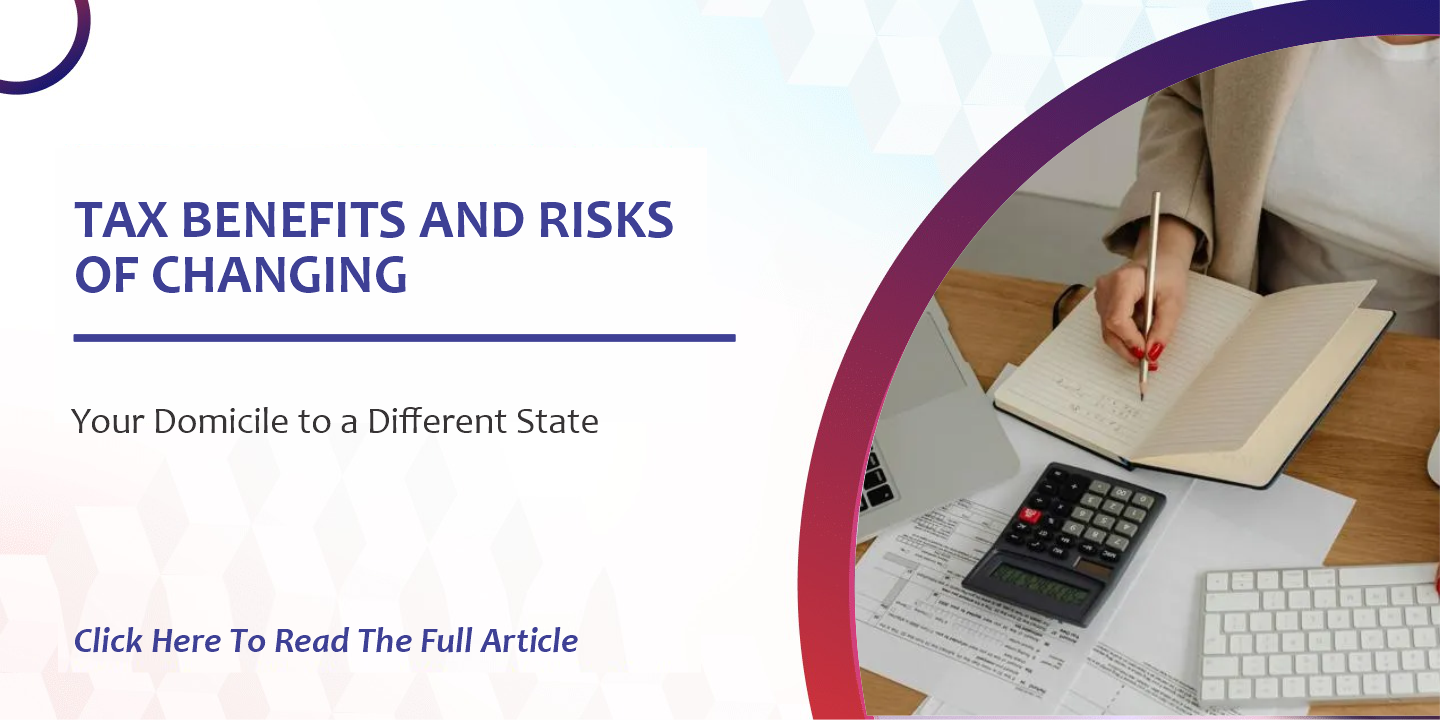In today’s dynamic economic landscape, individuals and families are increasingly exploring ways to optimize their financial situation, and one strategy that has garnered significant attention is changing one’s domicile to a different state.
This decision, however, is not as simple as packing up and moving; it comes with a mix of enticing tax benefits and potential risks. In this comprehensive guide, we will explore what domicile means, the tax implications of relocating, the benefits you might enjoy, the pitfalls to avoid, and how to successfully manage the transition.
Whether you are seeking lower tax rates, better investment opportunities, or simply a more favorable cost of living, understanding the full scope of tax benefits and risks is crucial before making such a pivotal move.

Understanding Domicile and Its Tax Implications
What Is Domicile?
Domicile is not just about where you live; it’s a legal determination of your primary residence. It is defined by several factors, including:
- Physical Presence: The state in which you spend the majority of your time.
- Intent to Remain: Evidence such as voter registration, driver’s license, and the location of your primary residence.
- Ties to the Community: Membership in local organizations, business affiliations, and social connections.
For tax purposes, your domicile is critical because it determines the state tax laws that apply to you. Even if you spend significant time in another state, your domicile is generally considered to be the state where you have the most substantial ties.
How Does Domicile Affect Taxes?
Your domicile influences several key areas:
- State Income Taxes: Your domicile state generally taxes all your income, regardless of where it’s earned. Changing your domicile can mean moving to a state with a lower or no state income tax.
- Property Taxes: States have varying property tax rates and assessment methods. A change in domicile might help you benefit from more favorable property tax rates.
- Estate and Inheritance Taxes: Some states impose estate or inheritance taxes, and your domicile can significantly affect your liabilities in these areas.
- Sales and Use Taxes: While these are typically based on where you make purchases, your domicile can sometimes influence other local tax obligations.
Understanding these factors is crucial when considering a domicile change, as the potential tax savings must be balanced against the challenges of establishing a new primary residence.
Tax Benefits of Changing Your Domicile
Changing your domicile to a different state can offer several potential tax benefits. Below, we explore some of the most significant advantages that motivate many to make the switch.

1. Lower or No State Income Tax
One of the most compelling reasons to change your domicile is to move to a state with lower or no state income tax. States like Florida, Texas, and Nevada, for example, do not impose a state income tax, which can result in significant savings for high-income earners. For many, this benefit alone can offset the cost and effort required to change their domicile.
2. Favorable Property Tax Rates
Property taxes can be a significant burden, especially for homeowners in high-tax states. By relocating to a state with more favorable property tax rates, you might lower your annual tax liability substantially. Additionally, some states offer exemptions or credits for primary residences, further reducing the overall cost.
3. Reduced Estate and Inheritance Taxes
Estate and inheritance taxes vary widely from state to state. If you reside in a state with high estate taxes, changing your domicile to a state with more lenient policies could help preserve more of your wealth for future generations. This is particularly important for those with sizable estates or family businesses.
4. Improved Business and Investment Climate
Some states offer tax incentives designed to attract businesses and high-net-worth individuals. These incentives might include credits for research and development, lower corporate taxes, or special tax zones that reduce the tax burden for new investments. Changing your domicile might enable you to take advantage of these benefits if you plan to expand or start a business.
5. Potential Savings on Sales Tax and Other Local Taxes
While the benefits of changing your domicile are most often discussed in terms of income, property, and estate taxes, other local taxes can also play a role. In some cases, relocating to a state with lower overall tax rates on goods and services can result in incremental savings, which add up over time.
Risks and Considerations of Changing Your Domicile
While the tax benefits can be substantial, changing your domicile is not without risks. It requires careful planning, thorough documentation, and a willingness to adapt to a new legal and financial environment.
1. Scrutiny from Your Former State
Many states with high tax rates are vigilant about taxpayers trying to evade their tax obligations. If you attempt to change your domicile solely for tax benefits, your former state may challenge your claim. Evidence such as your voting records, driver’s license, and financial transactions will be scrutinized to determine if your change of domicile is genuine.
2. The Cost of Relocation
Changing your domicile is not as simple as buying a new house and moving your belongings. The process can involve significant financial costs, including moving expenses, new licensing fees, and even potential changes in healthcare and education costs. These costs should be factored into your decision.
3. Lifestyle Adjustments
Your current community, friends, and local amenities play an important role in your overall quality of life. Moving to a different state may mean sacrificing familiar networks and comfort zones, which can impact your lifestyle. It is essential to weigh the financial benefits against the potential personal and social costs.
4. Complexity in Proving Domicile Change
Establishing a new domicile requires clear, consistent evidence of your intent to make the new state your permanent home. This includes:
- Obtaining a New Driver’s License and Vehicle Registration: These are often seen as strong indicators of domicile.
- Registering to Vote: Voting in local and state elections in your new home is another key indicator.
- Changing Financial Accounts: Opening bank accounts and moving investments to local institutions can help support your claim.
- Leasing or Purchasing a Home: The most concrete evidence is owning or renting property in the new state.
Even with these measures, proving a change of domicile can be complex, particularly if your former state aggressively challenges your residency status.
5. Impact on Other Areas of Life
Changing your domicile affects more than just taxes. It can influence your eligibility for certain state programs, affect your healthcare options, and even change your legal responsibilities. For instance, divorce laws, community property rules, and even the way courts handle disputes can vary significantly from state to state.
Steps to Successfully Change Your Domicile
If you’re considering changing your domicile, a systematic approach can help mitigate risks and ensure a smooth transition. Below are some essential steps to follow:
1. Research Your Destination State
Before making any decisions, thoroughly research the state you plan to move to. Consider:
- Tax Rates: Compare state income, property, and sales taxes.
- Legal Requirements: Understand the residency requirements and the process for changing your domicile.
- Quality of Life: Evaluate the cost of living, educational opportunities, healthcare facilities, and local amenities.
2. Create a Detailed Plan
Plan your move well in advance. Outline a timeline that includes:
- The Date of Relocation: Set a clear date when you intend to establish your new domicile.
- Key Actions: List the necessary steps such as obtaining a new driver’s license, registering to vote, and updating your financial records.
- Documentation: Prepare and organize all documentation that proves your new residency.
3. Update Your Legal and Financial Documents
Make sure that all your important documents reflect your new address and state of residency. This includes:
- Driver’s License and Vehicle Registration: Update these immediately upon moving.
- Voter Registration: Register to vote in your new state as soon as possible.
- Bank Accounts and Investments: Notify your financial institutions of your change of address.
- Insurance Policies: Update your home, auto, and health insurance policies to reflect your new location.
4. Establish Community Ties
To further solidify your claim of a new domicile, get involved in your new community. This can include:
- Joining Local Organizations: Become a member of local clubs, community centers, or religious organizations.
- Networking: Establish relationships with neighbors, local business owners, and community leaders.
- Engaging in Local Activities: Participate in community events and volunteer work to demonstrate your commitment to the new state.
5. Consult Professionals

Given the complexity of changing your domicile, consider consulting with professionals such as:
- Tax Advisors: They can help you understand the tax implications and ensure you’re in compliance with all state laws.
- Legal Counsel: An attorney specializing in residency issues can provide guidance on how to document your change of domicile effectively.
- Financial Planners: They can help you assess the overall financial impact of the move, including costs and benefits.
Case Studies and Real-World Examples
Example 1: Moving to a No-Income-Tax State
Consider the case of a high-income professional living in a state with steep income taxes who decides to relocate to a state like Florida or Texas. By changing their domicile, the individual could potentially save tens of thousands of dollars annually. However, they must be prepared to face rigorous scrutiny from their former state and ensure that all aspects of their life—banking, voting, and even community involvement—reflect their new residency.
Example 2: Changing Domicile for Business Advantages
A small business owner might choose to move their domicile to a state that offers favorable tax incentives for entrepreneurs. In addition to lower corporate taxes, some states provide credits for job creation and research and development. The business owner, however, must weigh these benefits against the disruption of moving operations and the initial costs of relocation. Proper documentation and adherence to state-specific regulations are critical to avoid challenges from the previous domicile state.
Example 3: Lifestyle-Driven Domicile Change
For many, the decision to change domicile isn’t solely about tax savings. Some individuals move to enjoy a different lifestyle, such as a quieter environment, better climate, or enhanced community resources. In these cases, while tax benefits might be an added bonus, the primary motivation is quality of life. Nonetheless, the individual still needs to manage the tax implications carefully to ensure they are not inadvertently exposed to new risks.
FAQs
Q1: What exactly is domicile, and why is it so important for tax purposes?
A: Domicile is your legal, permanent home where you intend to return, even if you are temporarily away. It is crucial for tax purposes because it determines which state’s tax laws apply to you. States tax all residents on their income, so your domicile can significantly affect your overall tax liability.
Q2: How can I prove that I have changed my domicile to a different state?
A: Proving a change of domicile requires a combination of evidence. Key documents include a new driver’s license, voter registration, updated vehicle registration, new home lease or purchase agreements, updated financial accounts, and evidence of community involvement. The more comprehensive your documentation, the stronger your claim will be.
Q3: What are the main tax benefits of changing your domicile?
A: The primary tax benefits include potentially lower or no state income tax, more favorable property tax rates, reduced estate and inheritance taxes, and access to business or investment incentives offered by the new state. These benefits can result in significant savings, particularly for high-income earners and business owners.
Q4: What risks should I be aware of before changing my domicile?
A: The risks include potential challenges from your former state regarding your residency claim, the financial cost of relocating, lifestyle adjustments, and the complexity of meeting all legal requirements to prove your new domicile. Additionally, changes in other areas such as healthcare, education, and legal obligations may affect your overall quality of life.
Q5: Can changing my domicile affect my eligibility for state-specific benefits or programs?
A: Yes, changing your domicile can impact your eligibility for state-specific benefits, programs, and even legal protections. Some states offer unique benefits to residents, such as educational grants or healthcare programs, which may not be available once you move. It is important to research how the change might affect all aspects of your financial and personal life.
Q6: How long does it typically take for a domicile change to be recognized for tax purposes?
A: There is no universal timeline, as the process can vary depending on the state and the thoroughness of your documentation. Generally, you should allow several months after your move for the change to be fully recognized by tax authorities. It’s wise to consult with a tax advisor to ensure that you meet all necessary requirements promptly.
Q7: Should I consult a professional before deciding to change my domicile?
A: Absolutely. Given the legal, tax, and personal complexities involved, consulting with tax advisors, legal counsel, and financial planners is highly recommended. Professionals can help you assess the full impact of the change, ensure compliance with state laws, and guide you through the documentation process to avoid potential pitfalls.
Conclusion
Changing your domicile to a different state can be an effective strategy to reduce your overall tax burden and take advantage of more favorable tax policies. However, the process is complex and requires careful planning, thorough documentation, and a clear understanding of both the benefits and risks involved. By weighing the potential tax benefits—such as lower income and property taxes, reduced estate liabilities, and enhanced business incentives—against the challenges of proving a new domicile, you can make a well-informed decision that aligns with your long-term financial goals.


